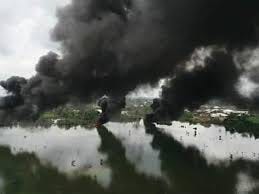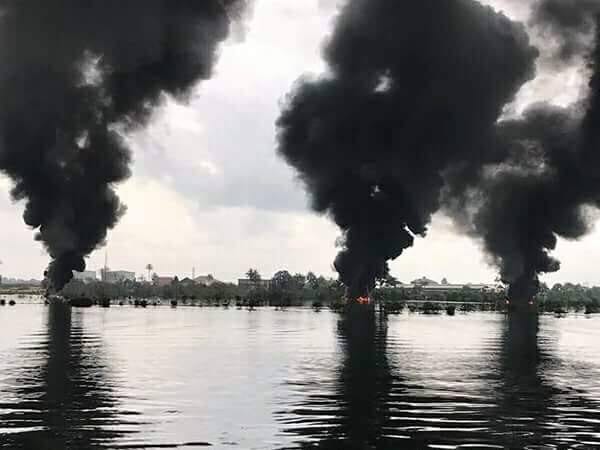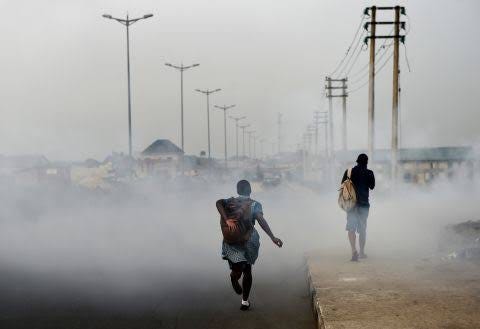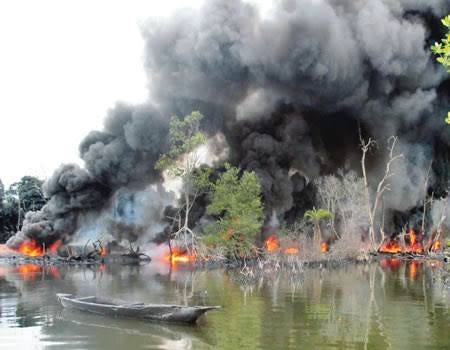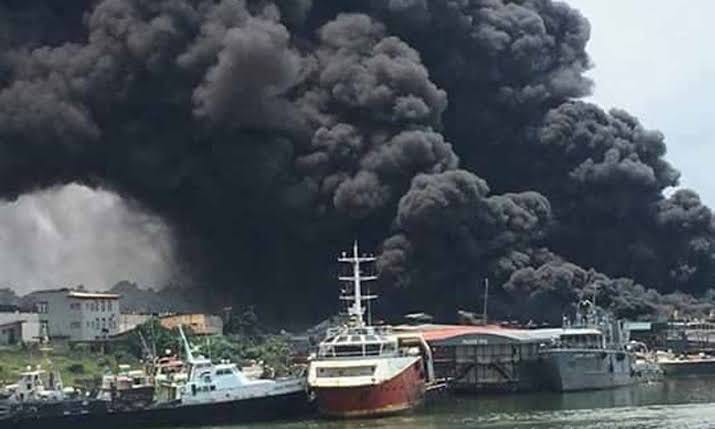Soot: A Catalyst of Climate Change in Nigeria
What are the other things people do to promote climate change? Read to find out as related to Nigeria.
The December sun blazes, and Nubari faces the challenge from soot. The soot stains his handkerchief. When he wipes his face with the handkerchief, the soot stains his face. When he cleans his lips with the handkerchief, and runs his tongue over his teeth, and looks at the mirror, the soot stains his tongue. When he puts the handkerchief inside his pocket, stares at the Port Harcourt afternoon in South-East of Nigeria, and sniffs in the air around him, biting his lip with anger, tapping n the handkerchief inside his pocket, the soot smells under his nose.
Ebenezar Wikina also suffers from the soot. She suffers from soot at another part of Port Harcourt. She suffers from the soot because while she spreads her clothes on the line, soot covers it. She suffers from the soot, because when she opens the window to her room, to enjoy the fresh air from the Atlantic Ocean, curses always spew out of her mouth, as soot covers the place. She suffers from soot, because when she desires a fresh air, and she breathes in, curses spew out of her mouth, as she doesn’t breathe in fresh air, or take in the ocean air, since soot covers the place.
In the past few years, people in places like Port Harcourt and other coastal areas in Nigeria suffocate under the onslaught of soot. According to several accounts, it began in 2015. However, within a few short years, the issue escalated, becoming one of the factors fuelling climate change in this part of the world, and now, people suffocate under the challenges brought by soot. In the newspapers, the story of soot takes the center stage. On the radio, the story of soot takes over the air waves, with tens of people complaining about climate change. On the T.V., the story of soot occupies pundits, as experts sit to deliberate over the invasion of soot, and to take positions about stopping the newspapers and radios and TV stations from having soot taking a center stage.
At a period of uncertainty, soot contributes in a no-little-way to forces promoting climate change. It is the second most important anthropogenic climate-forcing agent after carbon, absorbing the shortwave radiation of the sun, thus contributing to global warming. It comes from illegal refineries. Due to greed, people steal fossil fuel from pipelines, boil it in illegal refineries, and soot becomes the result. Due to the law, officials pounce on the illegal refineries, burn it down, and soot becomes the result. Due to the forces of nature, the soot rises in the air, and soot invasion becomes the result. Due to the black cloud of soot hanging over many cities in the coastal areas of Nigeria, and due to the presence of illegal refineries around and due to the effects of climate change tormenting everyone, soot and more soot and even more soot pervade the place, with pain the result.
The problem, really, comes from the focus on the consumption of fossil fuel. It is needed in cars. It is needed in motor-cycles, to skirt through the narrow streets in the coastal areas of Nigeria. It is needed in factories, to produce things like plastic and clothes, to power the generators and official vehicles. It is needed so much and so desperately and so indiscriminately that oil thieves, knowing it sells, decide to engage in setting up illegal refineries, knowing they would get their money back, because millions of Nigerians need the product, even if bad, for their homes and motor-cycles, and cars.
Everyone knows the Niger Delta. Everyone knows it’s Nigeria’s oil-producing region. Everyone knows it houses refineries by Big Oil. What everyone does not know or does not care to know or pretends not to know is that Big Oil and the refineries help towards making Nigeria Africa’s major producer of greenhouse gasses, but with the addition to the soot from the illegal refineries, situation worsens, climate change becoming an even major challenge in the Niger Delta.
“You’re wiping your face with a handkerchief,” said Saatah Nubari to CNN in 2018 , “and everything is black. You’re trying to clean your car, and everything is black. Or you look at the soles of your feet, and it is just pitch black.”
It isn’t just about the soles of people’s feet becoming black. It isn’t just about wiping faces with soot-stained handkerchief, and frowning at the soot-stained sweat and grease. It isn’t just about cleaning soot-stained cars and motor-cycles and innumerable other things. It is as much about people’s health, and as much about their breathing, and as much about their well-being, as it is about the soles of people’s feet becoming black. In other words, health concerns prevail over the prevalence of soot, which fuels climate change. The health concerns go beyond statistics. The truth is, people complain about breathing difficulties as a result of breathing in the soot. People lament over lung problems as a result of the soot entering their nose, as it makes them nauseous. People fear about having a short life span as a result of the soot, running to dispensaries for drugs, visiting traditional healers for cure. Experts say the hospitals and health centers and pharmacies of the affected areas are inundated by patients who develop lung problems, breathing problems, and other problems as a result of breathing in the soot.
“The soot started towards the end of 2015,” Nubari told CNN. “It wasn’t this bad. People were complaining. But between last year and this year, it has become much worse.”
One thing has become much worse as a result of the soot. Apart from the health challenges, it alters cloud formation. It adds to the havoc from carbon dioxide, coming in a black cloud over cities. It fuels the presence of other greenhouse gasses, and they hang over trees, staining their leaves with soot. It acts like an anthropogenic climate force agent of carbon dioxide and methane and other gasses. It burns the people causing the soot, so they face problems much more serious than the one from methane into the atmosphere. Combined with the gasses produced through oil exploration, combined with the gasses flared into the atmosphere of the Niger Delta, combined with the problems caused by oil spills, climate change becomes problematic in this part of the world, and it could become more problematic when the sea shore rises, when temperature increases, when floods intensify in the next few years, according to statistics rolled out by international bodies. It has become so bad people suffer from severe burns from explosions resulting from utilizing improperly refined kerosene from the illegal refineries. It has become so bad people suffer from loss of properties from explosions through the kerosene, some of the properties involving houses. It has become so bad and so destructive and so frightening that civil society groups, local communities, and youths engage in demonstrations against the government for allowing people utilize the improperly refined kerosene from the illegal refineries.
“Although artisanal refining of stolen crude is indicated in the current acceleration of soot and ambient air pollution in the Niger Delta region, it is also important to point out that decades of reckless exploration and production activities by multinational companies, ill-maintained oil pipelines and facilities, routine gas flaring, and lax regulatory frameworks are responsible for the dangerous situation in which millions of people who reside in the Niger Delta region now find themselves,” said Godwin Ojo, Executive Director of Environmental Rights Action/Friends of the Earth (ERA/FoEN), in a press release seen by Adetokunbo Sees.
So while one isn’t exonerating Big Oil from climate change in this part of the world, something has to be done about the new catalyst of climate change in the coastal areas of Nigeria. Something must be done about the new situation in the Niger Delta, for children to be spared from the constant poisoning of the atmosphere from fossil fuel pollution. Something must be done to prevent respiratory illnesses in people, as well as the uptick of patients in hospitals, especially young children whose lungs suffer, so further damage isn’t done by the new catalyst of climate change in the coastal areas of Nigeria.
Governments should work with youths. It should liaise with civil service groups, in order to reach the people. It should work with youths and civil society groups and air quality monitors for investigations into a situation that affects so many youths.
According to Ojo in the press statement, the government could “conduct health surveys across the region to ensure early detection and treatment of air pollution-related illnesses.” Governments should carry out researches into why people steal fossil fuel from Big Oil pipelines, the reason why local people agree to patronize the illegal products. It could identify the deeper reasons behind people flooding ill-maintained oil pipelines, damaging them for the contents in them, then boiling them in such a way as to cause people to flood hospitals with various ailments from the operation of illegal refineries.
In other words, such investigations would reveal that a rising cost of living makes youths to engage in the business. The rise in unemployment rates makes them to vandalize pipelines, especially since COVID-19 caused thousands of people to lose their jobs. The absence of clean renewable energy alternative makes killer kerosene attractive, with fuel-efficient cooking stoves nonexistent, allowing a condition that drives up demand for illegally refined fossil fuel. With the rising cost of living and increase in unemployment rates and non-existence of fuel-efficient cooking materials despoiling a condition already complicated by climate change, the governments and other others should devise policies to discourage youths and unscrupulous people and unscrupulous companies and unscrupulous officials from engaging in the business. Without these measures, soot would continue intensifying climate change in the coastal areas of Nigeria, and this could prove disastrous as temperatures rise and cities sink and floods increase with a greater frequency in the next few years.




